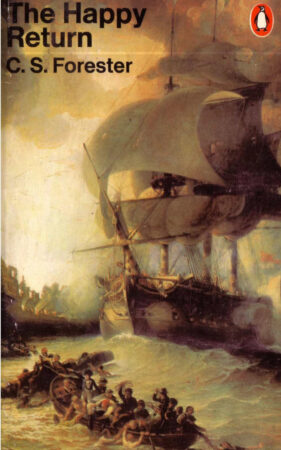I’ve read enough novels influenced by this series, particularly ones billed as “Horatio Hornblower in Spaaaace”, that I figured I should at least give the first book a shot. Beat to Quarters (aka The Happy Return – a rare instance of the original British title being worse than the American one) was C.S. Forester’s introduction to the character and the first novel published, but as he fleshed out the series, he delved backwards into Hornblower’s history as well, such that this is actually the sixth novel in terms of the series internal chronology.

The novel opens with Captain Hornblower being ordered by British Admiralty to South America in order to form an alliance with rebels (led by a madman who fancies himself as a god) against the Spanish colonial government. Along the way, he encounters a larger Spanish warship, is obliged to take on Lady Barbara Wellesley (the sister of the Duke of Wellington) as a distracting passenger, and must deal with the shifting allegiances of the Spanish government.
Forester was clearly an influence on other writers operating in a similar milieu. When it comes to my little Salty Sea-Dog project, Patrick O’Brian’s Aubrey-Maturin series was clearly seen as an heir to Forester’s Hornblower series, has many similarities, and as such, makes for a good point of comparison. Which is to say, Forester’s approach is significantly better than O’Brian’s.
Superficially, these books are quite similar. British naval tales set during the Napoleonic Wars with elements of restrained British romance sprinkled throughout, I must say that Forester’s take on this demonstrates a much better sense of storytelling and page turning ability. O’Brian’s books are quite episodic in nature, and Forester also has a bit of this, but does so in a much more fluid manner, with one episode leading to the next, building in tension and scope as we go along, eventually reaching a suitable climax. O’Brian’s tales felt perfunctory and anticlimactic to me, while Forester provides a better sense of pacing and escalation of stakes.
Forester clearly knows his seafaring stuff, but does not feel obligated to overburden the story with jargon in the way that O’Brian tends to do. His prose is direct and clear, and while the whole affair retains a typically British stiff upper lip, the characters are relatable and their travails lively. Despite what I’ve always thought of as a silly name, Horatio Hornblower himself is a bit gruff in this first entry in the series, but he softens a bit as you get into his head and see why he makes the decisions that he does (even as he’s filled with self-doubt, something I typically don’t love in a story like this, he’s ultimately quite competent and decisive). He’s certainly faced with a series of difficult dilemmas throughout, and there is one big sequence of naval warfare that is extremely well executed (again, Forester balances the technical aspects of the battle with a page-turning, character-based approach that flows more readily than O’Brian’s jargon-heavy exposition).
I’m definitely interested in continuing the series, always a good sign, and indeed, I might even revisit some of the aforementioned SF renditions of this sort of thing. I’ve already read all the Vorkosigan books, but I might have to check out more of the Honor Harrington series (or watch some Star Trek or pick up another book series, there are a lot of options…) There’s also a decently regarded 1951 film adaptation of this first novel, under the title Captain Horatio Hornblower, starring Gregory Peck and directed by the fittingly eyepatched Raoul Walsh that I shall have to check out at some point (apparently there was a TV series as well, but that does not appear to be widely available).
So ends my Salty Sea-Dog Era of reading, though it will live on as I make my way through more of the Horatio Hornblower books (I already have the next one sitting on the shelf, so this is not an idle threat). Altogether a worthy exercise, and it’s funny, I just picked up a collection of Edgar Allen Poe stories to kick off my Six Weeks of Halloween reading and the first story is, fittingly, a salty sea-dog story. So perhaps there are more salty sea-dogs in my future than I originally thought.